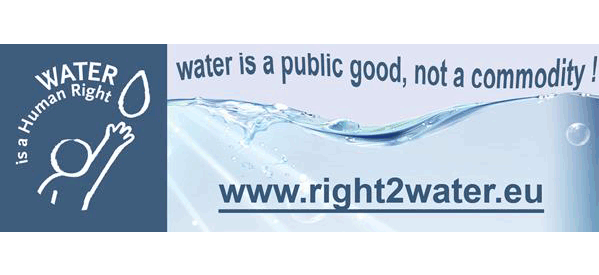First European Citizens’ Initiative in History to Reach 1 Million Supporters Despite Legal and Technical Barriers
The European Citizens’ Initiative (ECI), Europe’s first step toward participatory and direct democracy, is a new tool, created by the Lisbon Treaty, which gives 1 million citizens the right to ask for changes to European law. As of today the ECI ‘Water is a Human Right’, with more than 1 million collected signatures, is the first ECI in European history to have succeeded in collecting a minimum number of signatures.
Jan Willem Goudriaan, organizer and Vice President of the Citizens’ Committee “Water is a Human Right” states: “Today we have reached an important milestone – one Million EU citizens agree that water and sanitation are human rights! The Right2Water ECI is a success, despite the legal and technical barriers forced upon us by the European Commission and Member States! We appreciate the support of so many and will continue campaigning to pass a strong message.”
While the initiative must continue to collect signatures in order to reach the distribution quorum of at least seven member states, and to compensate for potentially invalid signatures, this is a critical moment in the European integration process.
“This is an important day for the evolution of European democracy as it appears that citizens want to make use of their new right of initiative which is the first element of transnational participatory democracy in the world” says Carsten Berg, ECI Campaign Director. “The organizers of the ‘Water is a Human Right’ initiative are to be congratulated all the more as they have managed their campaign under extraordinarily difficult conditions. Thousands of signatures have been lost due to important defects in the online collection system offered by the European Commission under the administration of Vice-President Maroš Šefčovič”.
IT specialist Xavier Dutoit, of the NGO Tech to the People, was asked to set up the online collection system for the “Right to Water” initiative: “The software currently offered by the European Commission requires major upgrades and has a long way to go before it fulfills its objectives; the current design cannot even be sufficiently modified without developing new software and certainly does not correspond to 21st century user expectations.” Other ECI organizers among the first 15 filed ECIs have reported similar experiences: “The Online Collection System is unnecessarily complex, and plagued by major programming faults – far more than would normally be expected. This has presented serious obstacles for ECI organizers, who have little in the way of financial or staff resources,” says Heike Aghte, who launched the European Citizens’ Initiative “30 km/h – making the streets liveable!” In order to resolve the wide array of problems connected to the online collection system several IT specialists have even decided to establish an ECI for a user-friendly central public online collection platform.
Technical problems have plagued the ECI; and the strict legal framework has made the success of this initiative remarkable. Campaigners report that EU citizens living outside of the EU cannot sign initiatives and people are generally reluctant to sign ECIs in countries that require IDs. Eighteen member states ask their citizens for personal identification numbers when signing an ECI. Such requirements are unnecessarily intrusive, raise privacy concerns and deter individuals from engaging in the democratic process. While the European Data Protection Supervisor concluded that ID card numbers are unnecessary for the purpose of an ECI, it is nonetheless mandatory in the majority of member states.
While ECI campaigners have regularly been expressing their grievances to both the Commission and the Parliament, reactions to complaints have been slow. The EC Vice-President’s declaration that “collecting signatures for the ECI will be very easy” could be seen as a serious misrepresentation of the situation.
The ECI Campaign insists that these kinds of problems need to urgently be addressed with an inter-institutional working group consisting of all stakeholders including the EC, EP, EESC, ECI organizers and ECI specialists, in order to prepare for the much-awaited ECI framework review and revision, foreseen in 2015.
“We have to eliminate the IT problems when it comes to signature gathering and offer a help infrastructure for ECI organizers. Otherwise only a very few large organizations with their own infrastructure and large budget will be able to run successful ECIs,” says Carsten Berg from the ECI Campaign.
The ECI Campaign is a coalition of democracy advocates, including more than 120 European NGOs dedicated to the creation and successful implementation of a European citizens’ initiative right. More information Carsten Berg at +49-1764-3064365 or visit www.citizens-initiative.eu.
ECI right2water: Pablo Sanchez, psanchez@epsu.org , 00 32 474 62 66 33 Background information of German Public TV with ENGLISH subtitles










